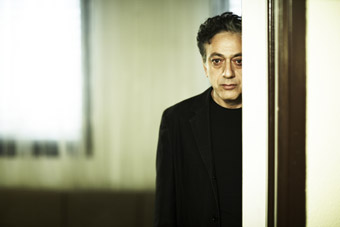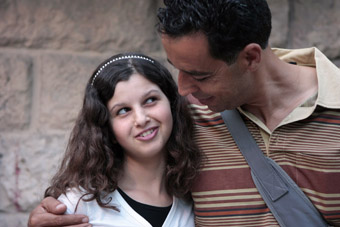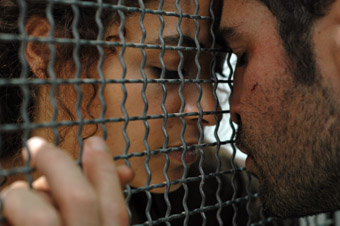everyday complexity
megan carrigy: 2009 palestinian film festival

The Time That Remains
IN 2008, I ATTENDED THE FIRST PALESTINIAN FILM FESTIVAL IN SYDNEY, AN EXCITING NEW INITIATIVE FROM CULTURAL MEDIA, A NOT-FOR-PROFIT ORGANIZATION ESTABLISHED IN 2007 TO PROMOTE INTERCULTURAL UNDERSTANDING BY SHOWCASING ARAB ARTS AND CULTURE. THE FESTIVAL WAS A GREAT SUCCESS, DRAWING LARGE AND DIVERSE AUDIENCES. THIS YEAR, CULTURAL MEDIA HAS EXPANDED ITS REACH, SCREENING NOT ONLY IN SYDNEY BUT ALSO IN MELBOURNE AND ADELAIDE. I ATTENDED IN SYDNEY AGAIN, WHERE THE FESTIVAL IS CLEARLY BUILDING ON ITS ENTHUSIASTIC FOLLOWING.
Slingshot Hip Hop, one of the most popular films from the 2008 festival, screened again in 2009, giving Cultural Media the opportunity to take this amazing film to other capital cities. Directed by Jackie Reem Salloum, this beautifully crafted documentary follows the emergence of hip-hop amongst young Palestinians living in Gaza, the West Bank and inside Israel. The film demonstrates the power of hip-hop as an educational tool that gives young people in Palestine the opportunity to speak their minds, to build self-esteem and to connect with each other. The filmmaking process itself even facilitates efforts made by these rappers to support each other despite the walls and the checkpoints that keep them apart, a plight felt most acutely by the group PR from Gaza, desperate to meet their fellow hip-hop artists in the flesh and hold them in their arms.

The Heart of Jenin
The documentary The Heart of Jenin, directed by Markus Vetter and Leon Geller, also tells a story that travels between the ugly walls that divide Gaza, Israel and the West Bank. The film follows Ismail Chatib, a Palestinian living in Gaza whose 12-year-old son, Ahmed Chatib, was fatally shot by Israeli soldiers.
With Ahmed on life support in an intensive care unit inside Israel, Ismail decides to donate his son’s organs to six Israeli children, a decision that gains a lot of media attention and is seen as a compassionate, peaceful act in the midst of a devastating conflict. The film follows his visits to these children and their families as well as offering an intimate portrait of what it means to live in Gaza, capturing the hopes and fears of those most restricted by the occupation.
The short animation Fatenah, directed by Ahmad Habash, illustrates the story of a young woman living in Gaza who faces great difficulties obtaining proper medical care for breast cancer under occupation.
A whole program of shorts showcased new work from around the globe including another animation, Encyclopaedia Britannica, made in Australia and directed by the festival’s artistic director Sohail Dahdal. Arafat & I, set in London and directed by Mahdi Fleifel, was also a highlight of this session, a hilarious story about a young Palestinian Londoner who thinks he has fallen in love for life when he goes out on a date with a woman born on the same day as Chairman Arafat.
Equally quirky was the festival’s opening night film, The Time That Remains, a semi-autobiographical work directed by Palestine’s most celebrated director, Elia Suleiman. The film depicts historical events that have affected generations of Palestinians since 1948, capturing the absurdity of daily life under occupation with candour and humour.
Edward Said: The Last Interview, directed by Mike Dibb, interviews one of Palestine’s most celebrated intellectuals, who spent most of his life living in America. Said gives insights into his life, his writings, his preoccupations, the legacy of his most famous book, Orientalism, and his involvements in Palestinian politics.

Pomegranates and Myrrh
Pomegranates and Myrrh, directed by Najwa Najjar, tells the story of Kamar (Yasmine Elmasri), whose husband, Zaid (Ashraf Farah) is thrown into an Israeli jail for refusing to give up his family’s land when it is appropriated by the Israeli government. The film shows the immense impact these two events have on Kamar as she tries to continue her day-to-day life.
In Sydney and Melbourne, the festival also included an advance screening of Amreeka, directed by Cherien Dabis, a gorgeous story about Muna (Nisreen Faour), a Palestinian single mother who migrates to America with her son, Fadi (Melkar Muallem), with hilarious and horrible results. Amreeka talks about family, racism, culture shock, love and misunderstanding in a way that beautifully connects the major political issues of our time with everyday lived experience. It is this power of cinema to make connections between different places and times that is at the heart of the Palestinian Film Festival.
In recent years, we have witnessed an explosion of touring festivals showcasing national cinemas in Australia. These have become an extremely popular part of the film exhibition landscape across our major capital cities. The most established and successful on the circuit include the Alliance Francaise French Film Festival, the Festival of German Films and the Spanish Film Festival. Other, newer festivals are gaining in popularity including the Canadian Film Festival and the Israeli Film Festival.
The Palestinian Film Festival is particularly significant within this fast growing film festival landscape because of the ongoing struggle of the Palestinian people to have their national identity and their right to nationhood recognised at all. Most of the other film festivals I have mentioned are run by government funded organisations with the express purpose of promoting national cultures in Australia. The Palestinian Film Festival is funded by an independent not-for-profit organisation that fulfils this function for Palestinian culture in the absence of a similar level of government infrastructure.
The Palestinian Film Festival is testimony to the vibrancy of Palestinian film culture, both at home and in the diaspora. The diverse, award-winning films screended this year crossed genres, experimented with form, went out onto the streets, re-imagined intricate family histories, captured deep personal intimacies and celebrated lives lived in all of their complexity.
2009 Palestinian Film Festival, artistic director Sohail Dahdal; Cultural Media director Naser Shakhtour, Palace Norton Street Cinemas, Sydney, Oct 29–Nov 1; Cinema Nova, Melbourne, Nov 12–15; Mercury Cinema, Adelaide, Nov 13–15
RealTime issue #94 Dec-Jan 2009 pg. 25






